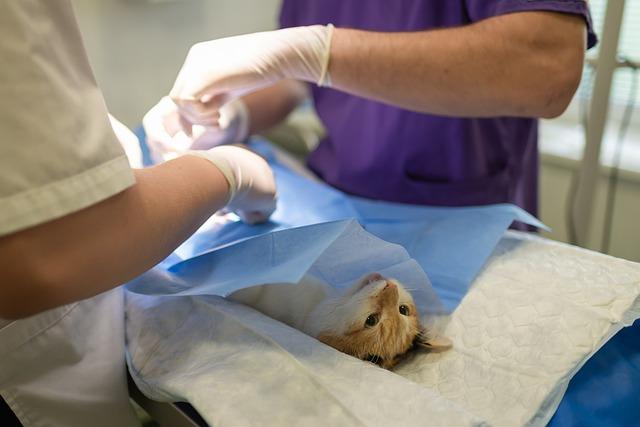In the quiet corners of our homes, where the soft purr of a cat or the joyful wag of a dog’s tail brings immeasurable comfort, lies an unspoken responsibility: the well-being of our cherished pets. As guardians of their health, we often find ourselves at a crossroads, especially when it comes to their diet. The question looms large—should we adhere strictly to vet-recommended diets, or is there room to explore alternative nutritional paths? This article embarks on a journey through the world of pet nutrition, balancing the wisdom of veterinary science with the curiosity of pet owners who seek the best for their furry companions. Join us as we navigate this flavorful terrain, where love, science, and a dash of adventure come together in the quest for the perfect pet diet.
Navigating the Nutritional Maze: Vet-Approved vs. Alternative Diets
Pet owners often find themselves at a crossroads when deciding between vet-recommended diets and exploring alternative options. Veterinary-approved diets are meticulously formulated to meet the specific health needs of pets, ensuring a balanced intake of nutrients. These diets often come with the endorsement of extensive research and clinical trials, providing peace of mind to conscientious pet parents. On the other hand, alternative diets—such as raw food, homemade meals, and holistic nutrition plans—offer a more personalized approach, potentially catering to unique dietary needs and preferences.
However, it’s essential to consider the pros and cons of each option. Vet-recommended diets typically offer:
- Scientifically backed formulations
- Consistency in nutrient content
- Ease of use and accessibility
Conversely, alternative diets can provide:
- Customization to fit specific health issues
- Potential for higher quality, fresh ingredients
- Greater control over what your pet consumes
Weighing these factors can help pet owners make an informed decision that aligns with their pet’s health requirements and lifestyle preferences.

The Science Behind Vet-Recommended Nutrition: A Deep Dive
At the core of vet-recommended nutrition lies a delicate balance of science and care, ensuring that our furry companions receive the optimal blend of nutrients tailored to their unique needs. Veterinarians meticulously craft these diets based on extensive research and clinical trials, taking into account factors such as:
- Breed-specific requirements: Different breeds have distinct nutritional needs, from energy levels to joint health.
- Life stage considerations: Puppies, adults, and seniors each require specific nutrient profiles to support their growth, maintenance, and aging processes.
- Health conditions: Tailored diets can help manage chronic conditions such as diabetes, kidney disease, and allergies.
Moreover, these diets often incorporate high-quality ingredients and are formulated to meet or exceed standards set by reputable organizations like the Association of American Feed Control Officials (AAFCO). This ensures that every bite your pet takes is packed with the essential vitamins, minerals, and macronutrients they need to thrive.

Exploring Alternative Diets: Myths, Facts, and Success Stories
When it comes to our furry companions, diet is a critical component of their overall health and well-being. Many pet owners find themselves at a crossroads, wondering whether to adhere strictly to vet-recommended diets or to explore alternative options. Both paths have their own sets of myths and facts to consider.
- Vet-Recommended Diets: Often tailored to specific health needs, these diets are backed by extensive research and clinical studies. However, they can sometimes be more expensive and less diverse.
- Alternative Diets: Options such as raw food, homemade meals, or even vegan diets for pets have gained popularity. These diets offer variety and can be tailored to individual preferences, but they also come with the risk of nutritional imbalances if not properly managed.
Success stories abound on both sides. Some pet owners swear by the transformation they’ve seen in their pets after switching to a vet-recommended diet, noting improved energy levels and overall health. Conversely, others have found great success with alternative diets, observing shinier coats, better digestion, and even resolution of chronic issues. The key is to do thorough research, consult with professionals, and closely monitor your pet’s health throughout any dietary transition.

Tailoring the Perfect Diet: Combining Expert Advice with Pet Preferences
Crafting the ideal diet for your furry friend is a harmonious blend of expert advice and their individual tastes. While veterinarian-recommended diets offer a reliable foundation, it’s essential to consider your pet’s unique preferences and needs. A vet’s guidance often focuses on balanced nutrition, addressing specific health concerns, and ensuring that all dietary requirements are met. However, incorporating your pet’s likes and dislikes can make meal times more enjoyable and stress-free for both of you.
When exploring alternatives, keep in mind:
- Ingredient quality: Opt for high-quality, natural ingredients that are free from artificial additives.
- Allergies and sensitivities: Be mindful of any known allergies and introduce new foods gradually.
- Variety and flavor: Mixing different proteins and vegetables can keep your pet’s diet interesting and palatable.
- Consultation: Regularly check in with your vet to ensure that any dietary changes align with your pet’s health needs.
Balancing professional advice with your pet’s preferences can lead to a diet that not only supports their health but also brings them joy.


































